All Time Low on arenas, writing and the new pop punk takeover
Alex Gaskarth and Jack Barakat talk
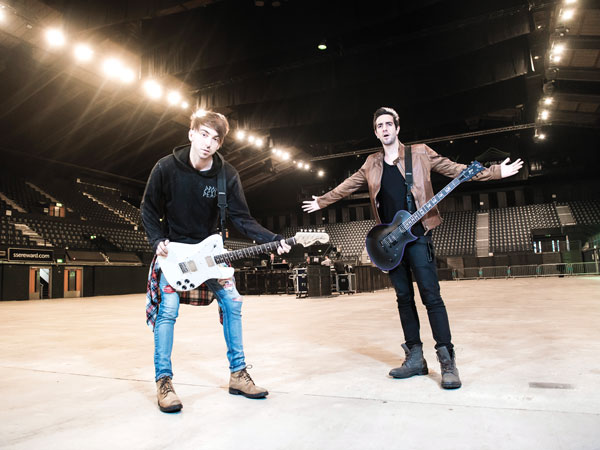
Introduction
If you thought pop-punk was dead, think again. All Time Low’s arena-conquering anthems prove it’s ready to take over the world again.
All Time Low are living the dream. They’re stood in the middle of an empty Wembley Arena, bewildered by the fact that in 24 hours’ time, the seats will be full.
"In a single city, they will have played to a collective audience of more than 30,000 people in one month"
Just four weeks ago, they co-headlined the only indoor London venue bigger than where they’re standing right now - The O2 - with partners in crime You Me At Six. So, let’s do the maths: that means in a single city, they will have played to a collective audience of more than 30,000 people in one month. Who said pop-punk is dead?
Rewind 10 years, however, and the four members were just graduating from high school, cutting their teeth on the Baltimore gig circuit covering Blink-182 and GreenDay. And while many felt that style of music had run its course, All Time Low kept the dream alive and now find themselves leading the revival for fast-paced, guitar-driven music.
Singer/guitarist Alex Gaskarth and fellow axeman Jack Barakat explain what an incredible journey it has been and how it feels to have won the admiration of the legends that inspired them in the first place...
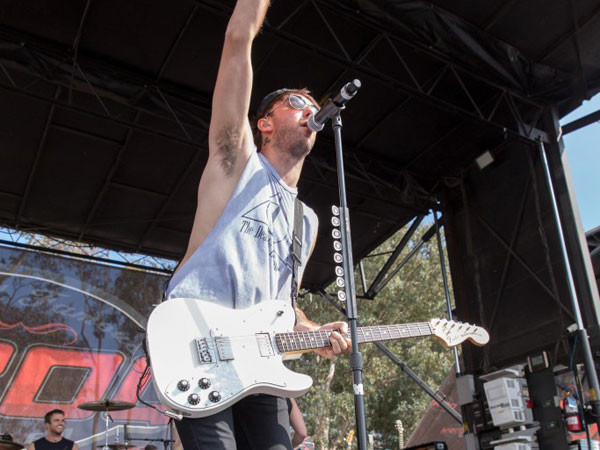
Hello Wembley...
So you’re headlining Wembley Arena! That must feel pretty damn amazing?
Alex: "It’s pretty insane! We’re headlining Wembley Arena and thinking, ‘How did this happen?’ I think we’ve always approached our band with a light-hearted vibe, we just wanna have a good time!
"The first time we came to London, we played some tiny venue inside King’s College in 2007, opening for Plain White T’s" - Jack
"Especially with our live shows... when you come to see us, it’s not just a band playing their record. It’s more of an experience, and whether it’s a 200-capacity hall or Wembley, people always walk away with that kind of feeling. Those were always the shows I latched onto myself. I think that’s why we’ve continued to have success in a way, without having a ton of radio or TV support."
Jack: "It’s a been a real slow-burner, though. The first time we came to London, we played some tiny venue inside King’s College in 2007, opening for Plain White T’s. We took the approach of slowly playing bigger venues over the years and hoping it kinda snowballs.
"And it has, especially in the UK! What can I say? You guys like great music [laughs]. Also, though we’re an American band, Alex is actually from England [he was born in Essex and moved to Maryland when he was seven]. So there’s that connection... maybe the kids appreciate one of their own!"
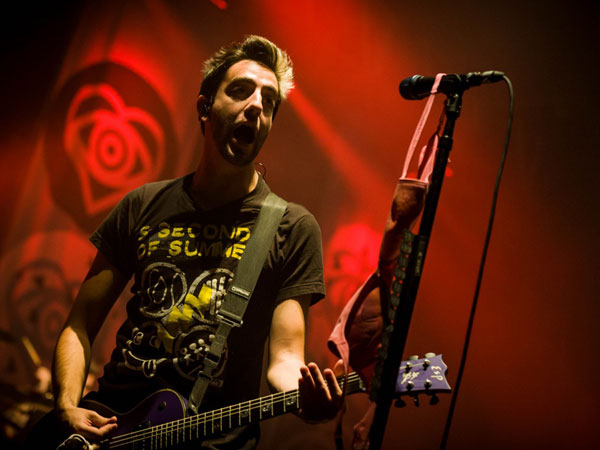
Keeping it fresh
And in that time, how much have you changed as a band?
Jack: "One thing about our live show is that it’s never been organised or premeditated. There’s no script: we’re just up there every night saying whatever comes into our minds, talking out of our asses!"
"We try to keep it a little bit fresh and don’t script anything beyond the songs we’re going to play" - Alex
Alex: "You see some bands - not to fault them, because it’s a good thing to do in some ways - but every single night is exactly the same. For those few hundred people that come to multiple shows, that must get a little boring. We try to keep it a little bit fresh and don’t script anything beyond the songs we’re going to play.
"Spontaneous things at rock shows is what makes them special. You don’t want to know when someone’s going to dive off the stage, pull a member of the crowd up, put on a gorilla costume or whatever! It’s the dumb shit that goes on at shows that makes them unique. That’s a philosophy we’ve kept from the beginning... just let it happen and let it flow!"
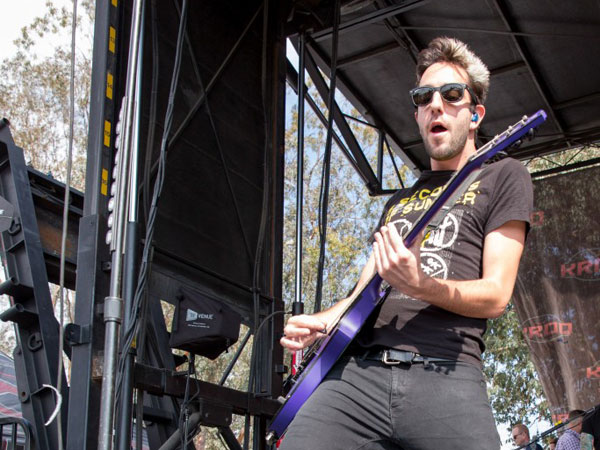
Six-string split
Can you tell us more about how you split guitar duties?
Jack: "The hardest parts are always for Alex. But if he has to concentrate on singing, then I have to man up [laughs]! He gets all the solos, too..."
"If you can come up with a four-note lick that really owns the song, that’s just as good as a shredding, insane guitar solo" - Alex
Alex: "Jack’s just lazy. No, it’s what serves the song best... but I am selfish with the solos! Look, we're not the most technical band in the world, but with pop-oriented music, the finesse in the artform is crafting memorable hooks, which for us is a ton of fun. If you can come up with a four-note lick that really owns the song, that’s just as good as a shredding, insane guitar solo."
Jack: "That comes from the Blink and Green Day in us, it’s never super-complicated, but rather super-memorable. You can hum the riffs, while shredding is for people who want to indulge. I guess it’s nice to have both if you can. When it comes to recording, it’s not about who is playing... it’s about who plays it better and faster!"
Alex: "There’s also just a vibe. If someone plays the part and it’s right, that’s the one you want. Take one and two are usually way better than take seven or eight. There’s never that same magic. It’s about sitting there in the moment and the first few tend to have that natural awesomeness.
"As far as writing the songs, I’ve always taken the driver’s seat. But I couldn’t do it without the other guys, it’s me bringing them the skeleton of a song and everyone else fleshing it out. That’s what makes it us. It was very conducive doing our new album, Future Hearts, as more of a band record. You never know what’s going to pop in your mind when you’re being creative."
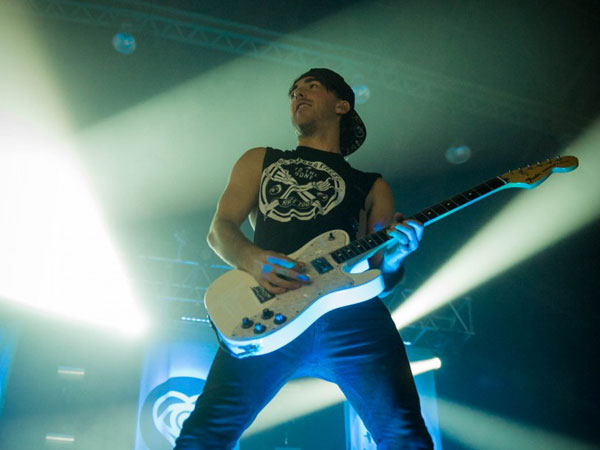
Rig refresh
What have been the main changes to your guitar rigs over the years?
Alex: "We recently switched to Kemper for touring, but before that I was playing Marshall, then Egnater for a while... you tend to find that one amp you’re comfortable with and get stuck there. It’s convenience, too: no one wants a million amps with them. But in the studio, it becomes a different thing. You strip away all your comforts and suddenly have access to any guitar you want, through any amp you want, through any cab you want!
"You get songs from just messing around, testing out tones. The gear can inspire signature moments on a record" - Jack
"It lets you experiment a bit more and start doing things you’ve never done before, which is part of the fun in making a record. You craft the sonic profile that makes the record. Between each of the albums, you can hear evolution and growth: on our first record, there were, like, one or two amps."
Jack: "You get songs from just messing around with amps in the studio, testing out tones. The gear can inspire signature moments on a record. It was our first time using EverTune, too. It was great... once you get it, you save so much time.
"It feels like cheating for sure, but it doesn’t affect the tone at all. For tracking rhythm guitars and octaves, it’s such a convenient thing. There’s nothing worse than recording a killer guitar part and then realising your G string was out of tune!"
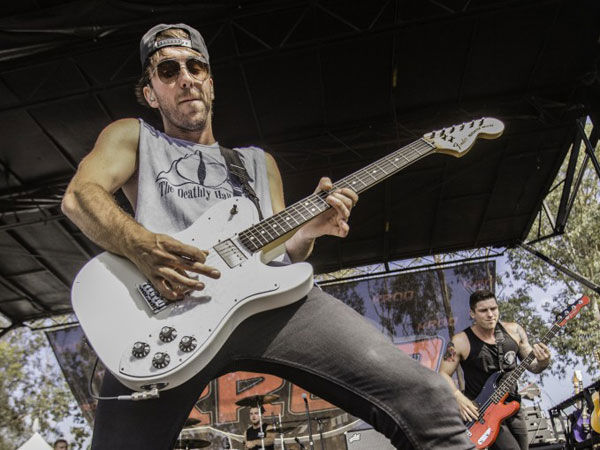
Cleaning up their act
We couldn’t help but notice more clean guitar sounds on your latest release...
"I’ve always been a massive fan of pop, unabashedly so. My first CDs were Backstreet Boys, Madonna and Spice Girls!" - Alex
Alex: "Yeah! We were fucking around with the clean channel for a lot of time to get the right sound for [lead single] Something’s Gotta Give. We wanted it to break up without losing the sweetness. That track was a lot of fun because the verses are way down and the choruses are way up. It’s that semi-clean, semi-dirty tone... it carries really well. Sometimes, you don’t need a paintbrush to paint, it’s just right the way it is."
And you could say it’s the biggest ‘pop’ production you’ve gone for...
Alex: "I’m a big Christina Aguilera fan! At the end of the day, there’s always been a fair amount of pop sensibility sprinkled into what we’ve done. I’ve always been a massive fan of pop, unabashedly so. My first CDs were Backstreet Boys, Madonna and Spice Girls... I’m not ashamed to admit that [laughs].
"It was a weird span of music and my parents always played The Beatles and Michael Jackson, all that kind of stuff. I’ve never wanted to lose the elements of being a rock band, but we always try to incorporate elements of pop and walk that line. Sometimes it goes a little one way, sometimes a little the other."
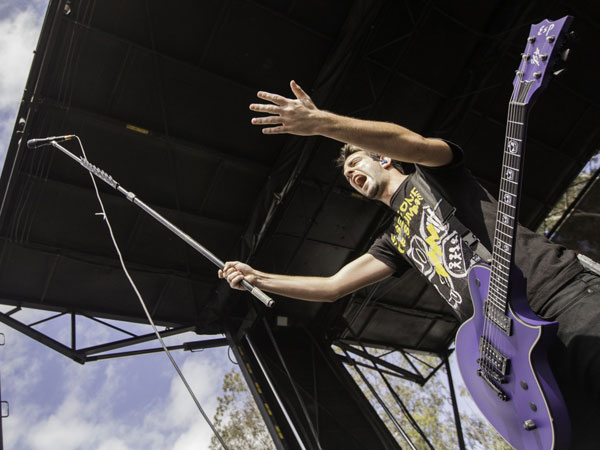
Meeting your heroes
How does it feel to have won the respect of the musicians who inspired you in the first place?
Alex: "It’s pretty fuckin’ insane, man. To have those moments where things come full circle, you’re standing in a room with Mark Hoppus from Blink-182 or Billie Joe Armstrong from Green Day and think, ‘Holy fuck! We’re friends!’ But in the back of my mind, I’m always back in my bedroom playing their riffs that inspired me in the first place.
"It really feels like we’re now a part of the music that inspired us when we were teenagers" - Jack
"The new record carries a lot of self-reflection, like looking back on all the times in our career that we felt we were right on target. All those moments where we’d be on stage and think, ‘Holy shit, this is working!’ That’s what Tidal Waves is all about... earning your place in that hall of greatness. Having someone like that pat you on the shoulder and say, ‘You’re one of us now, welcome to the club!’
"And then when Mark Hoppus came and actually sang on it, it really put the icing on that cake. It had the blessing of one of the guys we’ve always looked up to. That’s pretty wild."
Jack: "It really feels like we’re now a part of the music that inspired us when we were teenagers. Blink-182, Green Day, Good Charlotte, Sum 41... those bands had the vibe we’re going for now. In a sense, that’s what growing up is. Throwing yourself at the wall and seeing what you become. That’s what Future Hearts is and it defines the whole record. A lot of it came from stories from when we were younger and in high school... It’s still weird to think that our heroes are now fans of our music..."
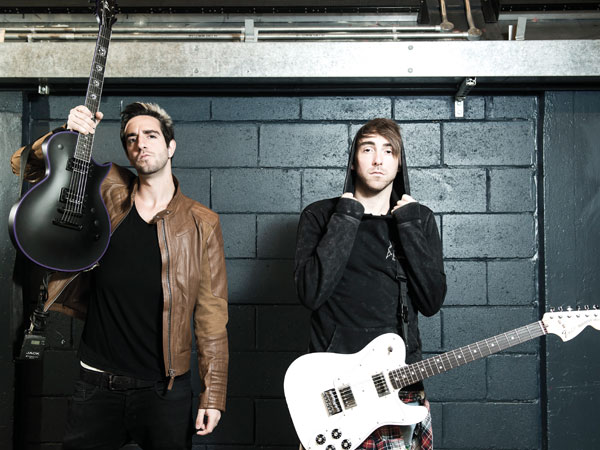
To the future
So what’s the state of pop-punk in 2015? What does the future look like?
Jack: "It feels like there’s been more pop-punk bands around over the past few years. But I think there was a lull for a while!"
"People are saying, ‘Oh yeah, I remember fast-paced, guitar-driven music... that’s fun!'" - Alex
Alex: "I don’t want to call it a renaissance, because it never really went away for me. But I think music is very cyclical. It definitely had its moment in the late 90s/early 00s and the bands that were championing it back then either changed, evolved, broke up or whatever... and made room for new music to come through.
"We started our band at that time, when it was tapering off in the grand scheme of things. We had this uphill battle of convincing everyone: ‘This music is still cool, guys!’ when it wasn’t at the forefront of what was going on. So it’s been quietly bubbling for a lot of bands. And for the first time, it’s started to feel like it’s making a comeback.
"People are saying, ‘Oh yeah, I remember fast-paced, guitar-driven music... that’s fun! What happened to that?’ It’s time for that to happen again, which is great because we’ve never wanted to do anything else!"
Amit has been writing for titles like Total Guitar, MusicRadar and Guitar World for over a decade and counts Richie Kotzen, Guthrie Govan and Jeff Beck among his primary influences. He's interviewed everyone from Ozzy Osbourne and Lemmy to Slash and Jimmy Page, and once even traded solos with a member of Slayer on a track released internationally. As a session guitarist, he's played alongside members of Judas Priest and Uriah Heep in London ensemble Metalworks, as well as handling lead guitars for legends like Glen Matlock (Sex Pistols, The Faces) and Stu Hamm (Steve Vai, Joe Satriani, G3).


